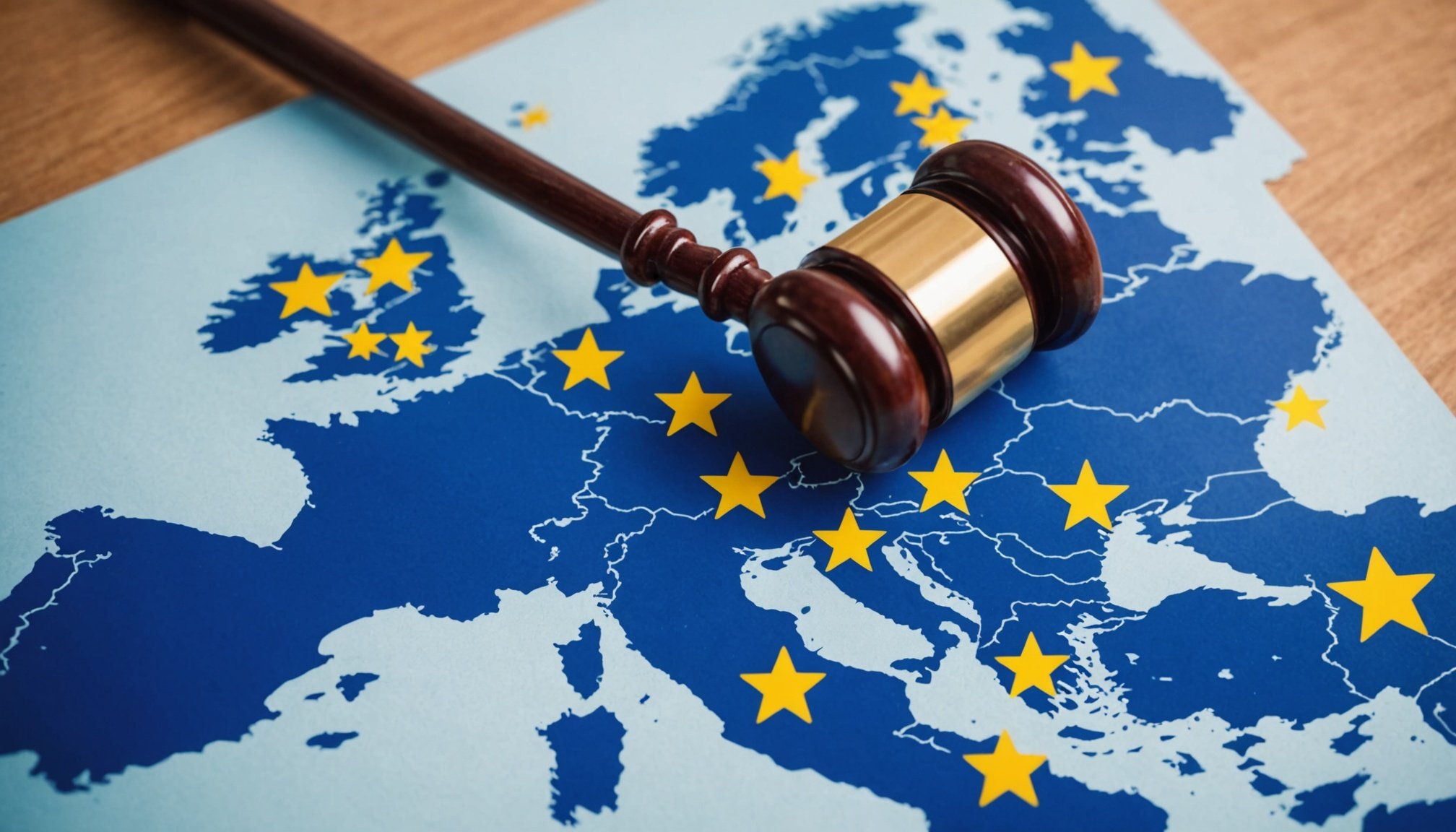Unlocking EU Market Opportunities: A Crucial Legal Guide for UK Businesses
Navigating the Post-Brexit Landscape
The UK’s departure from the European Union, commonly known as Brexit, has significantly altered the business landscape for UK companies looking to expand into European markets. While the separation has introduced new challenges, it also presents opportunities for businesses that are well-prepared and informed. Here’s a comprehensive guide to help UK businesses navigate the legal and regulatory aspects of accessing EU markets.
Understanding the New Regulatory Environment
Since Brexit, the UK is no longer part of the EU’s single market and customs union. This change means that UK businesses must comply with new regulations and standards to access EU markets. Here are some key areas to focus on:
-
Customs and Tariffs: With the UK outside the EU’s customs union, businesses need to understand the new tariff regimes and customs procedures. This includes obtaining the necessary customs declarations and complying with rules of origin to avoid unnecessary tariffs[3].
-
Data Protection: The EU’s General Data Protection Regulation (GDPR) remains a critical aspect for businesses handling personal data. UK businesses must ensure they comply with GDPR when dealing with EU customers or partners. The UK’s Data Protection Act 2018 mirrors many of GDPR’s provisions, but ongoing compliance is essential.
In the same genre : Navigating legal responsibilities: a complete guide to the competition act 1998 for uk businesses
-
Financial Services: The UK’s financial services sector faces new challenges in accessing EU markets. Businesses need to understand the passporting rules and how to obtain the necessary licenses to operate within the EU. The EU’s MiFID II and other financial regulations must be carefully navigated[3].
Compliance with EU Regulations
Compliance with EU regulations is paramount for UK businesses aiming to access European markets. Here are some key regulations to consider:
-
Data Act: The EU’s Data Act aims to facilitate data sharing and reuse within the EU. UK businesses need to understand how this act impacts their data management and sharing practices, especially if they operate in sectors like IoT, industrial data, or public sector data.
-
Digital Markets Act: This act regulates large digital platforms and aims to ensure fair competition. UK businesses, especially those in the tech sector, need to be aware of these regulations to avoid antitrust issues and ensure compliance.
-
Intellectual Property: Protecting intellectual property (IP) is crucial when expanding into new markets. UK businesses should ensure their IP rights are protected under EU law, including trademarks, patents, and copyrights.
Building a Strong Market Strategy
To succeed in the EU market, UK businesses need a robust market strategy that takes into account the new regulatory environment.
Market Research and Data Analysis
Market research is essential for understanding the EU market’s dynamics. Here are some steps to follow:
-
Gather Data: Use market research reports, industry analyses, and consumer surveys to gather data about your target market. This data will help you understand consumer preferences, market trends, and competition.
“`plaintext
-
Identify Target Market: Determine which EU countries offer the best opportunities for your products or services.
-
Analyze Competition: Study your competitors in the EU market to understand their strengths and weaknesses.
-
Assess Market Trends: Keep an eye on market trends and consumer behavior to stay ahead of the competition.
“` -
Use Data Effectively: The data you gather should inform your business strategy. Use it to identify growth opportunities, optimize your product or service offerings, and improve customer engagement.
Developing High-Quality Products and Services
To compete effectively in the EU market, UK businesses must ensure their products and services meet high standards.
-
Compliance with EU Standards: Ensure your products comply with EU standards and regulations. This includes health and safety standards, environmental regulations, and product labeling requirements.
“`plaintext
-
CE Marking: Obtain the necessary CE marking for your products to indicate compliance with EU health, safety, and environmental protection standards.
-
Eco-Design: Comply with EU eco-design regulations to ensure your products are energy-efficient and environmentally friendly.
“` -
Quality Assurance: Implement robust quality assurance processes to ensure your products and services meet the expectations of EU consumers.
Accessing EU Markets: Practical Steps
Accessing EU markets involves several practical steps that UK businesses must take.
Establishing a Presence in the EU
Having a physical presence in the EU can significantly facilitate market access.
-
Setting Up an EU Office: Consider setting up an office or subsidiary in an EU country. This can help you better understand local market conditions and build stronger relationships with EU customers and partners.
“`plaintext
-
Choose the Right Location: Select an EU country that is strategically located and has a favorable business environment.
-
Register Your Business: Register your business in the chosen EU country and comply with local regulations.
“` -
Partnering with EU Businesses: Forming partnerships with EU businesses can also be an effective way to access EU markets. This can include joint ventures, distribution agreements, or strategic partnerships.
Leveraging Government Support
The UK government and various EU institutions offer support mechanisms to help businesses navigate the new landscape.
-
UK Government Initiatives: The UK government has introduced several initiatives to support businesses in accessing EU markets. These include trade missions, export finance schemes, and regulatory guidance.
“`plaintext
-
Trade Missions: Participate in trade missions organized by the UK government to connect with EU businesses and policymakers.
-
Export Finance: Utilize export finance schemes to secure funding for your export activities.
“` -
EU Funding and Programs: The EU also offers various funding programs and initiatives to support businesses, especially in areas like innovation, sustainability, and digital transformation.
Managing Competition and Growth
In the competitive EU market, UK businesses must focus on driving growth and managing competition effectively.
Competitive Strategy
To stay competitive, UK businesses need to develop a robust competitive strategy.
-
Differentiation: Differentiate your products or services from those of your competitors. Focus on unique selling points, high-quality offerings, and excellent customer service.
“`plaintext
-
Unique Selling Proposition (USP): Identify your USP and communicate it effectively to your target market.
-
Customer Feedback: Use customer feedback to improve your products and services and stay ahead of the competition.
“` -
Innovation: Invest in innovation to stay ahead of the curve. This includes adopting new technologies, developing new products, and improving existing services.
Long-Term Growth
For long-term growth, UK businesses need to adopt a sustainable and forward-looking approach.
-
Net Zero Commitments: Align your business with the EU’s net zero goals. Invest in sustainable practices, reduce your carbon footprint, and adopt environmentally friendly technologies.
“`plaintext
-
Sustainability Reporting: Publish sustainability reports to demonstrate your commitment to net zero goals.
-
Green Technologies: Adopt green technologies and practices to reduce your environmental impact.
“` -
Investment in Digital Markets: Invest in digital markets to leverage the potential of digital transformation. This includes adopting e-commerce platforms, using data analytics, and enhancing digital customer experiences.
Case Studies and Success Stories
Several UK businesses have successfully navigated the post-Brexit landscape and are thriving in EU markets.
Example: Dropshipping with Spocket
Companies like those using Spocket for dropshipping have found innovative ways to access EU markets. By leveraging local suppliers and integrating with major e-commerce platforms, these businesses can offer high-quality products with rapid shipping times, thereby satisfying EU customers effectively[1].
Example: Food Trucks and Catering Services
Food trucks and catering services have also seen success by offering unique, locally-sourced cuisine. By obtaining the necessary permits and targeting popular events and locations, these businesses can capitalize on the diverse culinary preferences of EU consumers[1]. and Future Outlook
Accessing EU markets post-Brexit requires a thorough understanding of the new regulatory environment, a robust market strategy, and practical steps to establish a presence in the EU.
Quotes from Industry Experts
-
“The key to success in the EU market is to be agile and adaptable. Businesses need to stay informed about regulatory changes and market trends to stay ahead of the competition,” says Chris Williamson, Economist at S&P Global Market Intelligence[4].
-
“The EU’s commitment to net zero and digital transformation presents significant opportunities for UK businesses. By aligning with these goals, businesses can drive long-term growth and sustainability,” notes Andrew Bailey, Governor of the Bank of England[3].
Table: Key EU Regulations for UK Businesses
| Regulation | Description | Impact on UK Businesses |
|---|---|---|
| GDPR | General Data Protection Regulation | Ensures data protection standards are met when dealing with EU customers or partners. |
| Data Act | Facilitates data sharing and reuse within the EU | Impacts data management and sharing practices, especially in IoT and industrial data. |
| Digital Markets Act | Regulates large digital platforms to ensure fair competition | Affects tech businesses and ensures compliance with antitrust regulations. |
| CE Marking | Indicates compliance with EU health, safety, and environmental standards | Necessary for products to be sold in the EU market. |
| Eco-Design | Ensures products are energy-efficient and environmentally friendly | Impacts product design and manufacturing processes. |
By following this guide, UK businesses can unlock the opportunities available in the EU market, drive growth, and build a strong presence in this competitive but rewarding environment.











